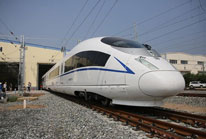

BEIJING, Aug. 30 -- At a time when the world economy is struggling with structural deficiencies and the effectiveness of the G20 is under fire, China's G20 presidency this year is expected to offer solutions.
Innovation and structural reform are among the options China will put forward during the G20 summit, which will run on Sept. 4-5 in the eastern city of Hangzhou.
Cao Yuanzheng, chief economist with the Bank of China, said that the eight years of slow recovery following the 2008 financial crisis highlights the necessity to shift from fiscal and monetary measures to innovation.
"To stimulate innovation, governments should create a favorable environment through structural reforms," he said.
Cao's view is echoed by James Laurenceson, deputy director of the Australia-China Relations Institute under the University of Technology, Sydney.
Short-term stimulus measures to encourage demand such as rapid credit expansion and zero interest rates have hit their limits. Structural reform is now the most realistic way to achieve sustainable improvements in living standards, said Laurenceson.h Economists also believe that China's measures to boost domestic growth can offer invaluable insight into restructuring.
Huang Wei, an expert on global governance with the Chinese Academy of Social Sciences, said that persist structural reform exploration has helped China maintain rapid growth during the past three decades, which can inspire the world.
Cao said that as a major market in the world, China's current supply-side structural reform is injecting vitality to domestic and international economies.
"China's experience is valuable to other countries, especially those developing countries facing similar problems," he said.
After several rounds of financial and monetary policy consultations this year ahead of the G20 summit, financial and central bank officials from G20 members announced nine priority areas and 48 guiding principles for structural reforms.
The priorities are expected to improve coordination and effectiveness among G20 members.
Financial ministers and central bank governors also introduced a quantitative and measurable index system to supervise and analyze G20 members' structural reform.
"The index system evaluates countries' economic performances in different aspects, which will push countries to come up with effective reform measures," said Huang, adding that the index system will likely deliver results later this year.
China's G20 presidency is also expected to help elevate the G20 from a crisis response mechanism to one that aims to support long-term global governance.
The G20 was initiated in 1999 following the Asian financial crisis. The G20 leaders' summit started after the outbreak of the 2008 global financial crisis.
Created as a de-risk mechanism, there have been calls for the G20 to transform itself from a crisis committee to a "peace time" steering committee for international policy coordination.
Laurenceson said the G20 needs to transit from being an organization that coordinates a crisis response to one that drives long-run improvements in living standards.
"China is the world's second largest economy and is responsible for 30 percent of global growth. That makes it an ideal candidate to play a leadership role in ensuring the G20 makes a successful transition and delivers widespread benefits," he said.
 World's fastest bullet train to start operating next month
World's fastest bullet train to start operating next month Huangluo: China's 'long hair village'
Huangluo: China's 'long hair village' Spectacular bridge with one of the tallest piers in the world
Spectacular bridge with one of the tallest piers in the world Magnificent view of Hukou Waterfall
Magnificent view of Hukou Waterfall A glimpse of Stride 2016 Zhurihe B military drill
A glimpse of Stride 2016 Zhurihe B military drill US Navy chief tours Liaoning aircraft carrier
US Navy chief tours Liaoning aircraft carrier Chinese American woman wins Miss Michigan
Chinese American woman wins Miss Michigan Centenarian couple takes first wedding photos
Centenarian couple takes first wedding photos Traditional Tibetan costumes presented during fashion show
Traditional Tibetan costumes presented during fashion show Top 10 livable Chinese cities
Top 10 livable Chinese cities Top 20 hottest women in the world in 2014
Top 20 hottest women in the world in 2014 Top 10 hardest languages to learn
Top 10 hardest languages to learn China’s Top 10 Unique Bridges, Highways and Roads
China’s Top 10 Unique Bridges, Highways and Roads Is India heading toward alliance with US?
Is India heading toward alliance with US? Lotus flowers bloom in G20 welcome
Lotus flowers bloom in G20 welcome Chinese NGOs struggle to go global due to funding, staffing and policy hurdles
Chinese NGOs struggle to go global due to funding, staffing and policy hurdles One-child policy enforcers have to find new roles after liberalization
One-child policy enforcers have to find new roles after liberalizationDay|Week